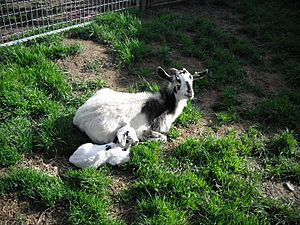Kiko goat facts for kids
 |
|
| Country of origin | New Zealand |
|---|---|
| Distribution |
|
| Use | meat |
| Traits | |
| Skin colour | variable |
| Horn status | horned or polled |
| Beard | bearded |
|
|
The Kiko is a special type of goat that was first bred in New Zealand. These goats are mostly raised for their meat. The name "Kiko" actually comes from the Māori word for meat!
Discover the Kiko Goat
The Story of Kiko Goats
Kiko goats were created in the 1980s by a couple named Garrick and Anne Batten. They wanted to make a strong and fast-growing meat goat. To do this, they bred local wild goats (goats that live in the wild) with special male dairy goats (goats raised for milk).
The dairy goat breeds used were the Anglo-Nubian, Saanen, and Toggenburg. The main goal was to create goats that grew quickly. They also wanted goats that could survive well in the hilly areas of New Zealand.
Kiko Goats in the United States
Kiko goats first came to the United States in 1992. A company called Goatex Group LLC brought them over. Today, there are three main groups in the US that keep track of Kiko goats. These groups are called registries. The biggest one is the NKR.
These registries help make sure Kiko goats are purebred. A "100% New Zealand" Kiko means its family tree can be traced back to the first goats from New Zealand. "Purebreds" are goats that are almost entirely New Zealand Kiko (at least 15/16ths). "Percentages" are goats that are at least half New Zealand Kiko (50%).
You can also find Kiko goats mixed with another breed called Boer goats. These mixes can be registered as "Genemaster™" through the NKR.
 | Sharif Bey |
 | Hale Woodruff |
 | Richmond Barthé |
 | Purvis Young |

